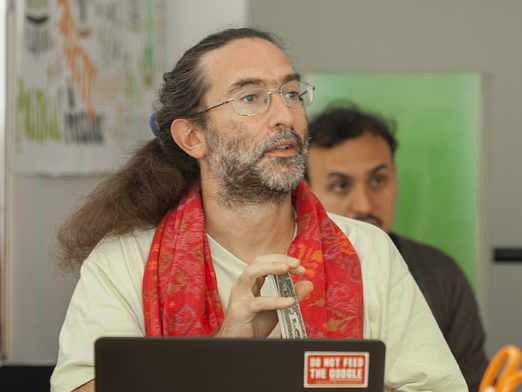A new breed of web site seeks to reconnect us to our neighbours - through the internet! Using up-front capital a polished web service can be built to mediate and encourage relationships between neighbours. But what happens when these sites are competing for territory?
I could sign up to Hey Neighbor! and tragically not know that the rest of the neighbourhood was on Nextdoor. In fact there are many such local groups already using Facebook. More silos means more advertising, more competition, and worse, more separation from our neighbours.
When a project takes on venture capital or sells shares, it becomes obliged to maximise the returns on investment, which means a national, or city by city marketing campaign, in hope of establishing monopoly. The progressive intentions of the founders of Nextdoor to build community are utterly incidental to the imperatives imposed by capital. Until a monopoly emerges, the usual venture capital model of building a technology - trying to build the biggest silo, is actually counter to the stated aims of these community building sites. And once the monopoly is established and the alternatives diminished, the users can do little to prevent abuses. When ning cut loose all their communities that couldn't pay, when Yahoo handed over users to be tortured, and when Facebook is in bed with the worlds most powerful drug ring, the users, the netizens have no voice in these 'communities' This is where the American Dream leads in the 21st Century. We should offer up a prayer for couchsurfing.org, which recently took on several million in capital, allegedly because it couldn't compete. There's truth in it, compared to communities who are seduced into subjugating themselves to extractive models of finance, the grass roots efforts can appear almost backward.
But I digress. The capitalist model imposes values and architecture entirely incompatible with the communities we need to build. If the intentions of the monied were really to build community, they would be engaging more with existing projects. The largest community (software) network I know of, CES, is a mutual credit network with over 300 installations and has been built over ten years as a labour of love by one person, partially supported by foundation money.
So how can we allow competition between community softwares without making silos and building monopolies beholden only to the self aggrandising logic of money? There is a well understood open source answer to this and it doesn't often attract investment. Defining APIs (Application programming interfaces) creates spaces for equivalent software components to work with the larger system, just as the open, published format of email allows innovators to build equivalent email reading/sending software.
This year Shareable magazine published an API for sharing, which I want to expand upon here. We need local portals which manage identity and strictly local issues, but which connect with open APIs to global web services, such as a 'stuff for sharing' service.
We also need local portals which manage identity and strictly local issues, but which connect with open APIs to global web services.
The next generation of social networks, distributed social networks may have an answer. The most well known, Diaspora, won't be ready for some time, but it has a model of 'pods' which store user data and enforce privacy settings across the rest of the network.
I would like to see local social networks owned, managed and hosted by local government or nonpolitical groups representing the community. They would be private to the outside, and would mainly be in place for local governance, local accounting, local exchange, and informal interactions. I would expect this to happen on an open, extensible platform that can move with the times and be adapted to local needs. The software for this could be supplied by vendors or volunteers.
But not all our needs can be met locally. There need to be services at the global level, accessed via the local sites though open APIs. The global services would need to be carefully managed by the community to prevent abuse.
- There needs to be a globalised marketplace where all the non-local businesses can be found. So I could find every hardwood floor specialist within 50 miles. It would not be all commercial, including baby sitters and stamp collectors alike. Real identities would be hidden at this level. It would be especially useful for people that live near borders or in cities where communities might be densely packed.
- Another essential non-local service would be ride-sharing. This sector has been totally shattered by too many projects.
- Accounting in non-local currencies.
- Events and activities should be available globally
- what other global services might be needed
I'm not just painting a pretty picture. The recent Community Forge / Community Tools partnership intends to take our software in exactly this direction. We are committed to open source, open standards, and pushing the governance to the edges, and we look to partner with other efforts who value that.

Comments1
Jct: All very hopeful but how
Jct: All very hopeful but how about doing something simple. UNISET UNILETS to set up your own P2P account so I can register a few weekends accommodations to your account in appreciation for the all the cheery news you've provided me over recent years. Take the 5 minutes to change your facebook info page just to get the feel of P2P personal online timebanking. http://johnturmel.com/uniset.htm